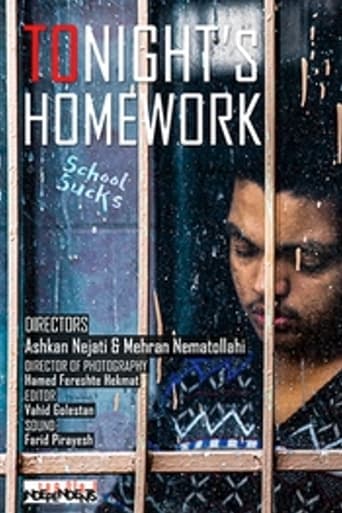Tonight’s Homework
In Homework (1989), Abbas Kiarostami put questions to students at a public school: questions about homework, punishments, and dreams of the future. The result was a portrait of the generation that grew up during the Iran-Iraq war, trapped by uncertainty and a rigid upbringing. Now, some 30 years later, directors Ashkan Nejati and Mehran Nematollahi repeat Kiarostami’s questions and come to the conclusion that the school system and society itself have changed dramatically. The gulf between rich and poor has grown far wider, and that has become evident in the schools. Parents, many of whom are illiterate, are unable to help their young ones, or otherwise too busy with their careers to supervise homework. Any sense of interest or guidance is absent. In Homework (1989), Abbas Kiarostami put questions to students at a public school: questions about homework, punishments, and dreams of the future. The result was a portrait of the generation that grew up during the Iran-Iraq war, trapped by uncertainty and a rigid upbringing. Now, some 30 years later, directors Ashkan Nejati and Mehran Nematollahi repeat Kiarostami’s questions and come to the conclusion that the school system and society itself have changed dramatically. The gulf between rich and poor has grown far wider, and that has become evident in the schools. Parents, many of whom are illiterate, are unable to help their young ones, or otherwise too busy with their careers to supervise homework. Any sense of interest or guidance is absent. In Homework (1989), Abbas Kiarostami put questions to students at a public school: questions about homework, punishments, and dreams of the future. The result was a portrait of the generation that grew up during the Iran-Iraq war, trapped by uncertainty and a rigid upbringing. Now, some 30 years later, directors Ashkan Nejati and Mehran Nematollahi repeat Kiarostami’s questions and come to the conclusion that the school system and society itself have changed dramatically. The gulf between rich and poor has grown far wider, and that has become evident in the schools. Parents, many of whom are illiterate, are unable to help their young ones, or otherwise too busy with their careers to supervise homework. Any sense of interest or guidance is absent. In Homework (1989), Abbas Kiarostami put questions to students at a public school: questions about homework, punishments, and dreams of the future. The result was a portrait of the generation that grew up during the Iran-Iraq war, trapped by uncertainty and a rigid upbringing. Now, some 30 years later, directors Ashkan Nejati and Mehran Nematollahi repeat Kiarostami’s questions and come to the conclusion that the school system and society itself have changed dramatically. The gulf between rich and poor has grown far wider, and that has become evident in the schools. Parents, many of whom are illiterate, are unable to help their young ones, or otherwise too busy with their careers to supervise homework. Any sense of interest or guidance is absent.



 AD
AD